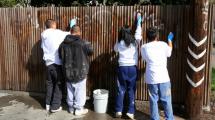Youth who receive special education services under the Individuals with Disabilities Education Act (IDEA 2004) and especially young adults of transition age, should be involved in planning for life after high school as early as possible and no later than age 16. Transition services should stem from the individual youth’s needs and strengths, ensuring that planning takes into account his or her interests, preferences, and desires for the future.
Additional Federal Resources for Teen Dating Violence
Center for Substance Abuse Prevention
The U.S. Department of Health and Human Services, Substance Abuse and Mental Health Services Administration offers free, web-based courses. Courses identify problems and risk factors, screening and assessment tools, prevention and intervention strategies, tools for clients, and legal issues surrounding interpersonal violence. Various courses offer continuing education credits and are designed for professionals as well as the general public.
Dating Matters
To help states and communities work to stop teen dating violence, the Centers for Disease Control and Prevention within the U.S. Department of Health and Human Services has developed Dating Matters™, a comprehensive teen dating violence prevention initiative based on the current evidence about what works in prevention. Dating Matters™ focuses on 11- to 14-year-olds in high-risk, urban communities. It includes preventive strategies for individuals, peers, families, schools, and neighborhoods.
Family and Youth Services Bureau
The U.S. Department of Health and Human Services, Administration for Children and Families administers funding of the Family Violence Prevention and Services Act, which provides funding to states, domestic violence coalitions, and tribes to support the needs of victims of dating violence, domestic violence, and family violence.
National Women's Health Information Center
The U.S. Department of Health and Human Services, Office on Women's Health, houses a National Women's Health Information Center. The Center is the most current and reliable resource on women's health. It provides links to a wide range of women's health-related material developed by the Department of Health and Human Services, other federal agencies, and private sector organizations.
Office for Victims of Crime
The U.S. Department of Justice, Office of Justice Programs, Office for Victims of Crime (OVC) was established in 1984 to oversee diverse programs that help victims of crime. OVC provides substantial funding to state victim assistance and compensation programs—the lifeline services that help victims heal. The agency supports training designed to educate criminal justice and allied professionals about the rights and needs of crime victims. OVC also sponsors an annual event in April to commemorate National Crime Victims’ Rights Week.
Office on Violence Against Women
The U.S. Department of Justice, Office on Violence Against Women works with victim advocates and law enforcement to develop grant programs that support a wide range of services, including advocacy, emergency shelter, law enforcement protection, and legal aid for victims of domestic violence, sexual assault, and stalking. Additionally, the Violence Against Women Office is leading efforts nationally and abroad to intervene in and prosecute crimes of trafficking in women and children and is addressing international domestic violence issues.
National Resource Center for Teen Dating Violence Awareness Month
This site, supported by the federal government, is a collaborative effort to promote February as Teen Dating Violence Awareness Month by providing a clearinghouse for all related activities from national and local organizations engaged in preventing teen dating violence and assisting victims.
Womenshealth.gov
This site from the U.S. Department of Health and Human Services, Office of Women’s Health provides information on dating violence, how to leave abusive relationships, how to remain safe when meeting new people, and how to avoid date rape drugs. This site also includes information specifically on teen dating violence and provides links to more information and resources.
Girlshealth.gov
This section of girlshealth.gov can help girls develop skills for building strong and healthy relationships of all types, including safe and healthy dating relationships. Included in the site are interactive quizzes girls can take to test what they have learned. Another section of girlshealth.gov features information on safety within relationships and how to tell whether you are in an abusive relationship.
Office of Population Affairs: Healthy Relationships
This site, from the Office of Population Affairs (OPA), provides a brief overview of dating violence as well as additional resources and information about healthy relationships, including dating and sexual relationships.
National Institute of Justice: Teen Dating Violence
This site from the National Institute of Justice provides a range of information on teen dating violence including information on setting the teen dating violence research agenda, workshops that have been held, and information on the Federal Interagency Workgroup on Teen Dating Violence. Additional information is provided on the prevalence of teen dating violence and prevention and intervention.
Other Resources on this Topic
Agencies
Announcements
Data Sources
Departments
Feature Articles
Hotlines
Programs
Publications
Resources
Technical Assistance
Tools & Guides
Videos & Podcasts
Websites
Youth Topics
Youth Briefs
Research links early leadership with increased self-efficacy and suggests that leadership can help youth to develop decision making and interpersonal skills that support successes in the workforce and adulthood. In addition, young leaders tend to be more involved in their communities, and have lower dropout rates than their peers. Youth leaders also show considerable benefits for their communities, providing valuable insight into the needs and interests of young people
Statistics reflecting the number of youth suffering from mental health, substance abuse, and co-occurring disorders highlight the necessity for schools, families, support staff, and communities to work together to develop targeted, coordinated, and comprehensive transition plans for young people with a history of mental health needs and/or substance abuse.
Nearly 30,000 youth aged out of foster care in Fiscal Year 2009, which represents nine percent of the young people involved in the foster care system that year. This transition can be challenging for youth, especially youth who have grown up in the child welfare system.
Research has demonstrated that as many as one in five children/youth have a diagnosable mental health disorder. Read about how coordination between public service agencies can improve treatment for these youth.
Civic engagement has the potential to empower young adults, increase their self-determination, and give them the skills and self-confidence they need to enter the workforce. Read about one youth’s experience in AmeriCorps National Civilian Community Corps (NCCC).






